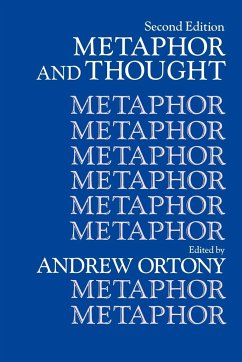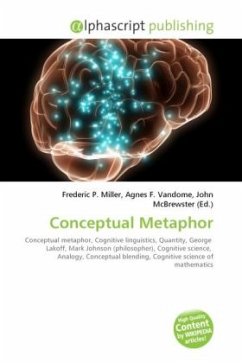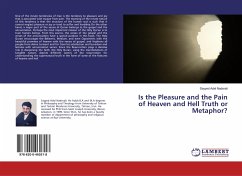- Broschiertes Buch
- Merkliste
- Auf die Merkliste
- Bewerten Bewerten
- Teilen
- Produkt teilen
- Produkterinnerung
- Produkterinnerung
Philosophers, psychologists, linguists, and educators raise serious questions about the viability of the traditional distinction between the literal and the metaphorical, discussing problems ranging from the definition of metaphor to its role in language acquisition, learning, scientific thinking, and the creation of social policy.
Andere Kunden interessierten sich auch für
![Metaphor Metaphor]() Metaphor136,99 €
Metaphor136,99 €![Rethinking Introspection Rethinking Introspection]() J. ButlerRethinking Introspection38,99 €
J. ButlerRethinking Introspection38,99 €![Conceptual Metaphor Conceptual Metaphor]() Conceptual Metaphor22,99 €
Conceptual Metaphor22,99 €![Rethinking Introspection Rethinking Introspection]() J. ButlerRethinking Introspection38,99 €
J. ButlerRethinking Introspection38,99 €![Explorations in Cognitive Science and Vygotskian Psychology Explorations in Cognitive Science and Vygotskian Psychology]() Habibollah GhassemzadehExplorations in Cognitive Science and Vygotskian Psychology47,99 €
Habibollah GhassemzadehExplorations in Cognitive Science and Vygotskian Psychology47,99 €![Is the Pleasure and the Pain of Heaven and Hell Truth or Metaphor? Is the Pleasure and the Pain of Heaven and Hell Truth or Metaphor?]() Sayyed Adel NaderaliIs the Pleasure and the Pain of Heaven and Hell Truth or Metaphor?36,99 €
Sayyed Adel NaderaliIs the Pleasure and the Pain of Heaven and Hell Truth or Metaphor?36,99 €![Metaphor Networks Metaphor Networks]() R. TrimMetaphor Networks41,99 €
R. TrimMetaphor Networks41,99 €-
-
-
Philosophers, psychologists, linguists, and educators raise serious questions about the viability of the traditional distinction between the literal and the metaphorical, discussing problems ranging from the definition of metaphor to its role in language acquisition, learning, scientific thinking, and the creation of social policy.
Produktdetails
- Produktdetails
- Verlag: Cambridge University Press
- Revised
- Seitenzahl: 696
- Erscheinungstermin: 3. September 2002
- Englisch
- Abmessung: 229mm x 152mm x 41mm
- Gewicht: 1112g
- ISBN-13: 9780521405614
- ISBN-10: 0521405610
- Artikelnr.: 21572928
- Herstellerkennzeichnung
- Libri GmbH
- Europaallee 1
- 36244 Bad Hersfeld
- gpsr@libri.de
- Verlag: Cambridge University Press
- Revised
- Seitenzahl: 696
- Erscheinungstermin: 3. September 2002
- Englisch
- Abmessung: 229mm x 152mm x 41mm
- Gewicht: 1112g
- ISBN-13: 9780521405614
- ISBN-10: 0521405610
- Artikelnr.: 21572928
- Herstellerkennzeichnung
- Libri GmbH
- Europaallee 1
- 36244 Bad Hersfeld
- gpsr@libri.de
Preface to first edition
Preface
List of contributors
1. Metaphor, language and thought ANDREW ORTONY
Part I. Metaphor and Meaning: 2. More about metaphor Max Black
Figurative speech and linguistics Jerrold M. Saddock
The semantics of metaphor L. Jonathan Cohen
Some problems with the notion of literal meanings David E. Rumelhart
Metaphor John R. Searle
Language, concepts, and worlds: Three domains of metaphor Samuel R. Levin
Observations on the pragmatics of metaphor Jerry L. Morgan
Part II. Metaphor and Representation: Generative metaphor: A perspective on problem-setting in social policy Donald A. Schon
The conduit metaphor: A case of frame conflict in our language about language Michael J. Reddy
The contemporary theory of metaphor George Lakoff
Process and products in making sense of tropes Raymond W. Gibbs, Jr
Metaphor, induction, and social policy: The Convergence of macroscopic and microscopic views Robert J. Sternberg, Roger Tourangeau, and Georgia
Part III. Metaphor and Understanding: Psychological processes in metaphor comprehension and memory Allan Paivio and Mary Walsh
The interpretation of novel metaphors Bruce Fraser
The role of similarity in similes and metaphors Andrew Ortony
Images and models, Similes and Metaphors George A. Miller
How Metaphors Work Sam Glucksberg and Boaz Keysar
Metaphor and irony: two levels of understanding Ellen Winner and Howard Gardner
Part IV. Metaphor and Science: The shift from metaphor to analogy in western science Dedre Gentner and Michael Jeziorski
Metaphor and theory change: What is 'metaphor' a metaphor for? Richard Boyd
Metaphor in science Thomas S. Kuhn
Metaphorical imprecision and the 'top-down' research strategy Zenon W. Pylyshyn
Part V. Metaphor and Education: The instructive metaphor: metaphoric aids to students' understanding of science Richard E. Mayer
Metaphor and learning Hugh G. Petrie and Rebecca S. Oshlag
Learning without metaphor Thomas F. Green
Educational uses of metaphor Thomas G. Sticht
References
Index.
Preface
List of contributors
1. Metaphor, language and thought ANDREW ORTONY
Part I. Metaphor and Meaning: 2. More about metaphor Max Black
Figurative speech and linguistics Jerrold M. Saddock
The semantics of metaphor L. Jonathan Cohen
Some problems with the notion of literal meanings David E. Rumelhart
Metaphor John R. Searle
Language, concepts, and worlds: Three domains of metaphor Samuel R. Levin
Observations on the pragmatics of metaphor Jerry L. Morgan
Part II. Metaphor and Representation: Generative metaphor: A perspective on problem-setting in social policy Donald A. Schon
The conduit metaphor: A case of frame conflict in our language about language Michael J. Reddy
The contemporary theory of metaphor George Lakoff
Process and products in making sense of tropes Raymond W. Gibbs, Jr
Metaphor, induction, and social policy: The Convergence of macroscopic and microscopic views Robert J. Sternberg, Roger Tourangeau, and Georgia
Part III. Metaphor and Understanding: Psychological processes in metaphor comprehension and memory Allan Paivio and Mary Walsh
The interpretation of novel metaphors Bruce Fraser
The role of similarity in similes and metaphors Andrew Ortony
Images and models, Similes and Metaphors George A. Miller
How Metaphors Work Sam Glucksberg and Boaz Keysar
Metaphor and irony: two levels of understanding Ellen Winner and Howard Gardner
Part IV. Metaphor and Science: The shift from metaphor to analogy in western science Dedre Gentner and Michael Jeziorski
Metaphor and theory change: What is 'metaphor' a metaphor for? Richard Boyd
Metaphor in science Thomas S. Kuhn
Metaphorical imprecision and the 'top-down' research strategy Zenon W. Pylyshyn
Part V. Metaphor and Education: The instructive metaphor: metaphoric aids to students' understanding of science Richard E. Mayer
Metaphor and learning Hugh G. Petrie and Rebecca S. Oshlag
Learning without metaphor Thomas F. Green
Educational uses of metaphor Thomas G. Sticht
References
Index.
Preface to first edition
Preface
List of contributors
1. Metaphor, language and thought ANDREW ORTONY
Part I. Metaphor and Meaning: 2. More about metaphor Max Black
Figurative speech and linguistics Jerrold M. Saddock
The semantics of metaphor L. Jonathan Cohen
Some problems with the notion of literal meanings David E. Rumelhart
Metaphor John R. Searle
Language, concepts, and worlds: Three domains of metaphor Samuel R. Levin
Observations on the pragmatics of metaphor Jerry L. Morgan
Part II. Metaphor and Representation: Generative metaphor: A perspective on problem-setting in social policy Donald A. Schon
The conduit metaphor: A case of frame conflict in our language about language Michael J. Reddy
The contemporary theory of metaphor George Lakoff
Process and products in making sense of tropes Raymond W. Gibbs, Jr
Metaphor, induction, and social policy: The Convergence of macroscopic and microscopic views Robert J. Sternberg, Roger Tourangeau, and Georgia
Part III. Metaphor and Understanding: Psychological processes in metaphor comprehension and memory Allan Paivio and Mary Walsh
The interpretation of novel metaphors Bruce Fraser
The role of similarity in similes and metaphors Andrew Ortony
Images and models, Similes and Metaphors George A. Miller
How Metaphors Work Sam Glucksberg and Boaz Keysar
Metaphor and irony: two levels of understanding Ellen Winner and Howard Gardner
Part IV. Metaphor and Science: The shift from metaphor to analogy in western science Dedre Gentner and Michael Jeziorski
Metaphor and theory change: What is 'metaphor' a metaphor for? Richard Boyd
Metaphor in science Thomas S. Kuhn
Metaphorical imprecision and the 'top-down' research strategy Zenon W. Pylyshyn
Part V. Metaphor and Education: The instructive metaphor: metaphoric aids to students' understanding of science Richard E. Mayer
Metaphor and learning Hugh G. Petrie and Rebecca S. Oshlag
Learning without metaphor Thomas F. Green
Educational uses of metaphor Thomas G. Sticht
References
Index.
Preface
List of contributors
1. Metaphor, language and thought ANDREW ORTONY
Part I. Metaphor and Meaning: 2. More about metaphor Max Black
Figurative speech and linguistics Jerrold M. Saddock
The semantics of metaphor L. Jonathan Cohen
Some problems with the notion of literal meanings David E. Rumelhart
Metaphor John R. Searle
Language, concepts, and worlds: Three domains of metaphor Samuel R. Levin
Observations on the pragmatics of metaphor Jerry L. Morgan
Part II. Metaphor and Representation: Generative metaphor: A perspective on problem-setting in social policy Donald A. Schon
The conduit metaphor: A case of frame conflict in our language about language Michael J. Reddy
The contemporary theory of metaphor George Lakoff
Process and products in making sense of tropes Raymond W. Gibbs, Jr
Metaphor, induction, and social policy: The Convergence of macroscopic and microscopic views Robert J. Sternberg, Roger Tourangeau, and Georgia
Part III. Metaphor and Understanding: Psychological processes in metaphor comprehension and memory Allan Paivio and Mary Walsh
The interpretation of novel metaphors Bruce Fraser
The role of similarity in similes and metaphors Andrew Ortony
Images and models, Similes and Metaphors George A. Miller
How Metaphors Work Sam Glucksberg and Boaz Keysar
Metaphor and irony: two levels of understanding Ellen Winner and Howard Gardner
Part IV. Metaphor and Science: The shift from metaphor to analogy in western science Dedre Gentner and Michael Jeziorski
Metaphor and theory change: What is 'metaphor' a metaphor for? Richard Boyd
Metaphor in science Thomas S. Kuhn
Metaphorical imprecision and the 'top-down' research strategy Zenon W. Pylyshyn
Part V. Metaphor and Education: The instructive metaphor: metaphoric aids to students' understanding of science Richard E. Mayer
Metaphor and learning Hugh G. Petrie and Rebecca S. Oshlag
Learning without metaphor Thomas F. Green
Educational uses of metaphor Thomas G. Sticht
References
Index.









